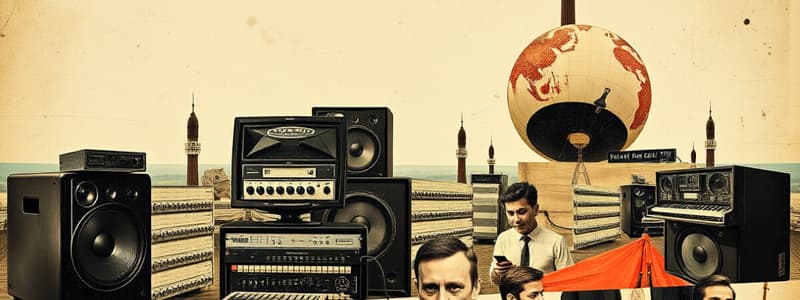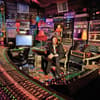Podcast
Questions and Answers
What is essential for producing audio material effectively?
What is essential for producing audio material effectively?
- Knowledge of broadcasting regulations
- Skills in using equipment and facilities (correct)
- Ability to write scripts
- Experience in live audience interaction
Which of the following best describes indecency in broadcasting?
Which of the following best describes indecency in broadcasting?
- Content explicitly showing violent acts
- Any content that upsets audiences
- Any programming aired after 10 PM
- Language offensive in contemporary community standards (correct)
What does the First Amendment guarantee regarding media content?
What does the First Amendment guarantee regarding media content?
- Protection against any form of censorship
- The right to use copyrighted material freely
- Freedom of speech with certain restrictions (correct)
- Absolute freedom to broadcast any material
Which statement best differentiates obscenity from indecency?
Which statement best differentiates obscenity from indecency?
What is crucial for mixing and editing different audio elements?
What is crucial for mixing and editing different audio elements?
In terms of broadcasting law, what is primarily the responsibility of a radio station?
In terms of broadcasting law, what is primarily the responsibility of a radio station?
Why have some broadcasters faced fines regarding content?
Why have some broadcasters faced fines regarding content?
What element is not essential for producing audio material?
What element is not essential for producing audio material?
What is one of the major challenges in defining indecency in media?
What is one of the major challenges in defining indecency in media?
What time period is referred to as the 'safe harbor' for airing indecent material?
What time period is referred to as the 'safe harbor' for airing indecent material?
What must public figures prove in order to sue for libel?
What must public figures prove in order to sue for libel?
Which of the following is true about invasion of privacy laws?
Which of the following is true about invasion of privacy laws?
What is considered illegal payola in broadcasting?
What is considered illegal payola in broadcasting?
For what purpose must radio stations pay music licensing organizations?
For what purpose must radio stations pay music licensing organizations?
What is an ethical dilemma that might arise in the media regarding personal relationships?
What is an ethical dilemma that might arise in the media regarding personal relationships?
What governs the ethical practices within media organizations?
What governs the ethical practices within media organizations?
Which of the following statements about copyright is true?
Which of the following statements about copyright is true?
In what context can a disc jockey accept compensation without legal risk?
In what context can a disc jockey accept compensation without legal risk?
What is a consequence of engaging in deceptive tricks in broadcasting?
What is a consequence of engaging in deceptive tricks in broadcasting?
How are ethical decisions in media different from legal decisions?
How are ethical decisions in media different from legal decisions?
What distinguishes an ordinary person from a public figure in libel cases?
What distinguishes an ordinary person from a public figure in libel cases?
Flashcards are hidden until you start studying
Study Notes
Equipment and Facilities
- Essential equipment includes recording and editing tools for audio material production.
- Skillful operation of the equipment is necessary for quality production.
- Consistent volume levels are crucial for audio continuity.
- Mixing and editing should ensure a smooth transition between elements, preventing one from overpowering another.
Laws
- The media is governed by various laws and regulations; radio stations often have designated legal responsibility.
- The First Amendment protects freedom of speech, enabling investigative reporting and controversial discussions, but does not allow for any expression.
- Indecency on air is characterized by language depicting sexual or excretory activities that offend contemporary community standards.
- Obscenity is a more serious offense involving material that sexually exploits, is offensive, and lacks serious literary or artistic value.
- Standards for indecency evolve over time and vary by location, complicating enforcement.
- The Federal Communications Commission (FCC) regulates indecent content on airwaves, with guidelines that restrict broadcasts during times when children may listen.
- A “safe harbor” exists from 10 PM to 6 AM, allowing the airing of indecent material without risk of penalty.
- Libel laws protect individuals from false and harmful statements, differing in standards between ordinary citizens and public figures.
- Invasion of privacy laws vary by state, yet typically grant individuals protection from unwanted attention or trespass.
- Payola laws prohibit accepting payment or gifts in return for preferential airplay of songs, requiring disclosure if such favors are accepted.
- Copyright laws necessitate permissions for using music or other creative works, with radio stations typically managing licensing through organizations.
- There are strict rules against deceptive practices, such as hoaxes.
Ethics
- Ethics differ from laws by focusing on personal judgment of right and wrong.
- Ethical behavior is not always mandated by law, posing dilemmas in decision-making.
- Professional codes of conduct provide guidelines for ethical behavior in media.
- Organizations, such as the Radio Television Digital News Association, create ethical standards to guide journalists.
- Ethical principles emphasize honesty, integrity, and the responsibility to inform the public accurately.
Studying That Suits You
Use AI to generate personalized quizzes and flashcards to suit your learning preferences.




